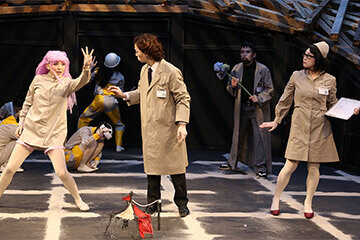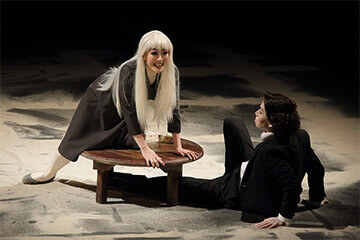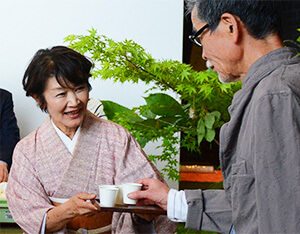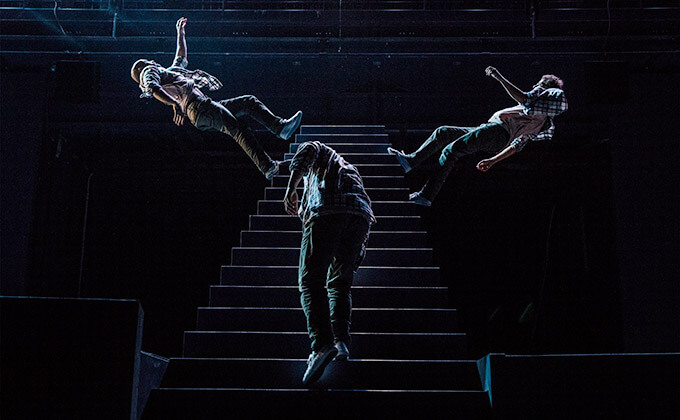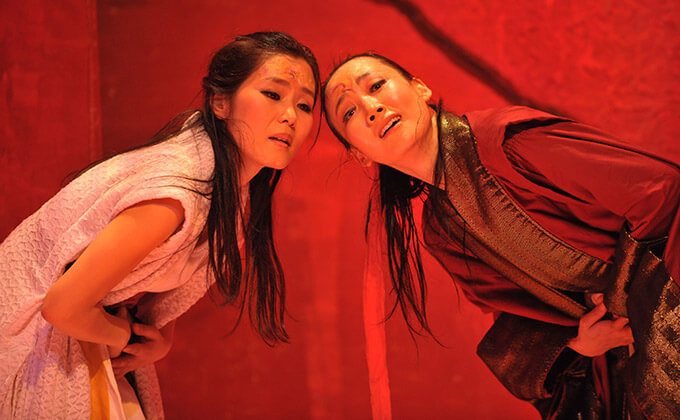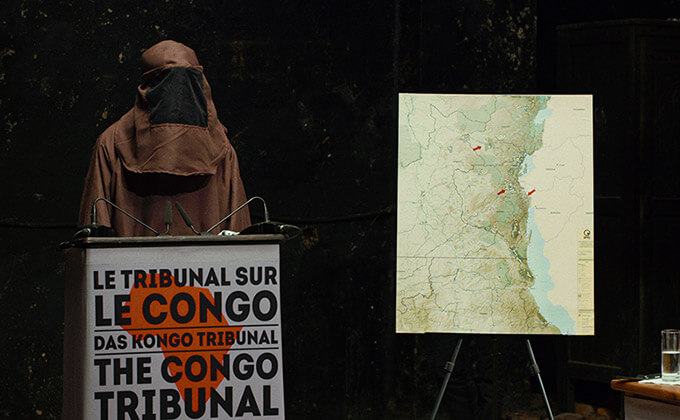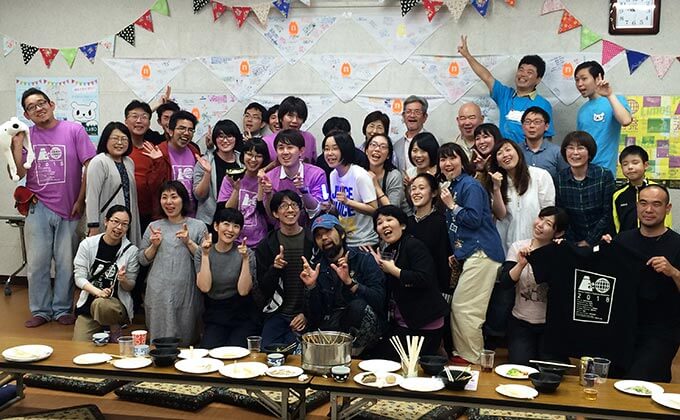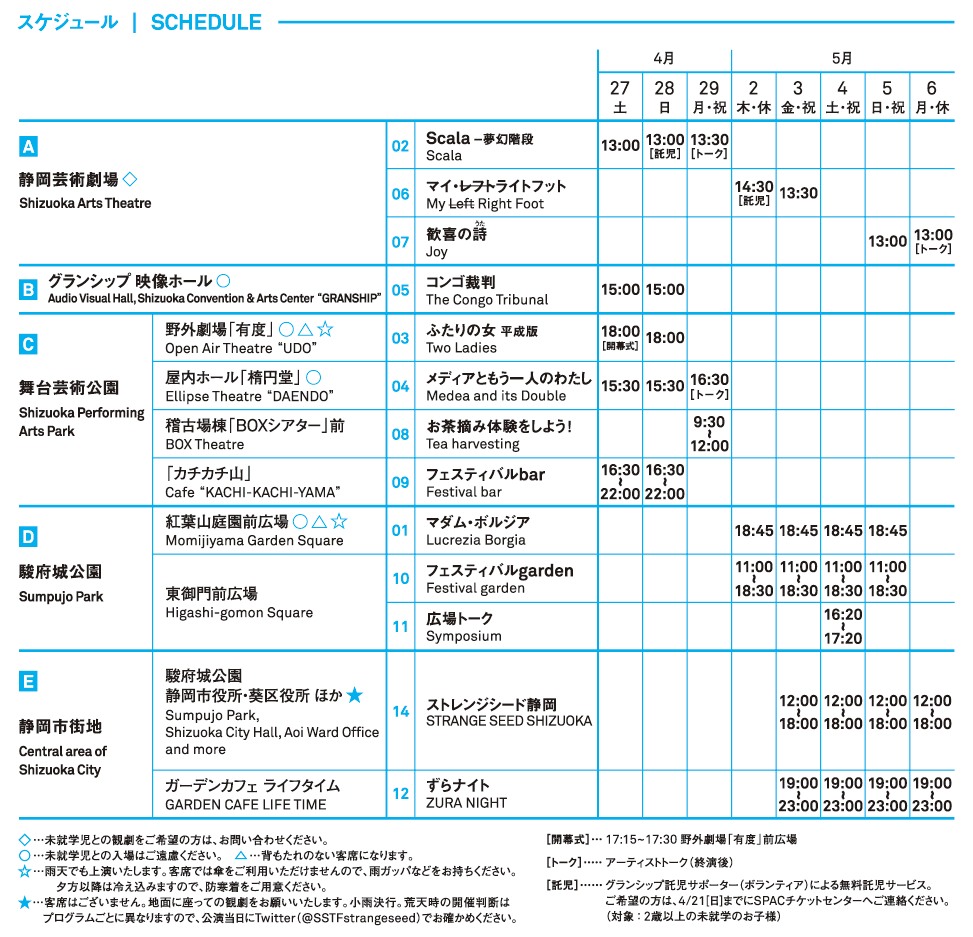
Two Ladies
© HIOKI Masami
Program Information
| Genre / City | Theatre / Shizuoka |
|---|---|
| Dates | 27 April at 18:00, 28 April at 18:00 |
| Venue | At Open Air Theatre “UDO”, Shizuoka Performing Arts Park |
| Duration | 80 minutes 100 minutes |
| Language | In Japanese with English subtitles |
| seat | Non-reserved seating |
| Directed by | MIYAGI Satoshi |
| Production | SPAC-Shizuoka Performing Arts Center |
Introduction
MIYAGI Satoshi presents an original work drawn from another of his favorite sources besides the Western classical world: Japanese underground theatre.
KARA Juro is a leading playwright and director. With his roots in Japan’s small-theatre scene (angura) in the 1960s, he is renowned for his poetic and melodious writing in works bursting with the bohemian energy of that era. In “Two Ladies,” which is one of his most famous works, KARA combines two stories. One of these is a love triangle from “The Tale of Genji” involving the prince, Hikaru Genji, his wife Aoi no Ue, and a lover of his named Rokujo-in. The other is drawn from the great Russian playwright Anton CHEKHOV’s short novel “Ward No. 6” that explores the border between sanity and insanity. Here, amid woodlands in SPAC’s unique, open-air Theatre Udo in the mountains, the world-famous director MIYAGI Satoshi presents KARA’s masterpiece in a magnificent production that’s also true to the spirit of its origins in a downtown Tokyo studio in 1979. When it premiered at Theatre Udo in 2009, and was staged there again in 2015, MIYAGI’s “Two Ladies — A Heisei Era Version” was applauded to the heavens above. Now let’s see what awaits its third time around.
Synopsis
In a mental hospital by a sandy beach on the Izu Peninsula, good-looking Dr. Koichi is seduced by a beautiful patient named Rokujo who gives him a key to her room. Then, when Koichi is watching a car race with his pregnant wife, Aoi, Rokujo suddenly appears in front of him after Aoi leaves her seat.
Director’s Profile
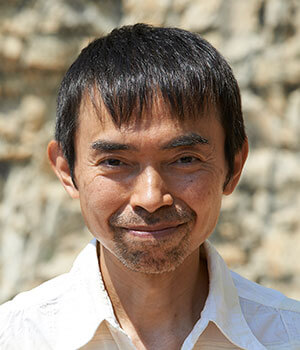
MIYAGI Satoshi
Born in Tokyo in 1959, after studying aesthetics at Tokyo University under ODASHIMA Yushi, WATANABE Moriaki and HIDAKA Hachiro, he founded the KU NA’ UKA theater company in 1990 and soon began staging plays overseas as well as in Japan. As a result, MIYAGI’s work — in which he often fuses contemporary textual interpretations with physical techniques and patterns of Asian theatre — has long been acclaimed both at home and far beyond. Indeed, in 2004 he received the 3rd Asahi Performing Arts Award, and the next year the 2nd Asahi Beer Art Award.
Since taking up his position with SPAC in April 2007, MIYAGI has staged many of his own works — including “Medea”, the Hindu epic “Mahabharata”, and “Peer Gynt” — and has invited artists from abroad to present pieces casting a keen eye on the modern world as they see it. In line with his aim to make theatre “a window to the world,” he has also started a new SPAC-based project aimed at the youth of Shizuoka.
In 2014, MIYAGI was invited to the Festival d’Avignon, where he received excellent reviews for his open-air version of the Hindu epic “Mahabharata” staged in La Carrière de Bourbon. Following that landmark achievement, the festival extended the honor of inviting MIYAGI to present a Buddhist interpretation he created of the ancient Greek mythological tragedy “Antigone” as its super-prestigious opening program for 2017. On that occasion, which was the first time an Asian play had ever been selected to launch the festival, MIYAGI’s exalted “stage” was the open-air Cour d’honneur du Palais des papes (the Honor Court of the Palace of Popes). By the play’s end, those towering medieval stone walls were ringing out with long and splendid standing ovations welcoming the work’s director and creator along with SPAC’s actors and staff — while more than 60 European media all gave great reviews.
In 2018, He received the 68th Minister of Education, Culture, Sports, Science and Technology’s Art Encouragement Prize of Drama.
Writer’s Profile
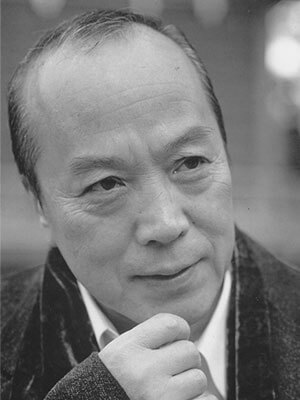
KARA Juro
Born in Tokyo in 1940. Graduated from Meiji University with a degree in theatre. He founded Jokyo Gekijou (Situation Theatre) in 1963. With spirit and uniqueness, he experimented with outdoor theatre, which is how the small theatre movement began. In 1967, in Shinjuku Hanazono Shrine, the red tent was built for the first time and “Koshimaki Osen” was staged. Subsequent activities continued around the tent performances, as well as performances overseas. In 1970 KARA won the KISHIDA Drama Award with “Shojo Kamen” and in 1982 the AKUTAGAWA Award as well as other awards with “A Letter from Young Sagawa”. In 1988 he formed Karagumi. He has led the troupe and has continued at a pace where he is staging at least two new works a year. He has worked as an actor in theatre and film, and in addition appeared in dramas and commercials.
Cast / Staff
Directed by MIYAGI Satoshi
Written by KARA Juro
Cast
TAIKI Miki, ISHII Moemi, OKUNO Akihito, KASUGAI Ippei, KIUCHI Kotoko, TAKEISHI Morimasa, MAGAI Kenji, MISHIMA Keita, YOSHIMI Ryo, WAKAMIYA Yoichi
<Staff>
Stage design: MURAMATSU Atsushi
Lighting design: HIGUCHI Masayuki
Sound design: KANEMITSU Hiroaki
Costume design: HATA Jennifer Yuki
Hair & Makeup design: KIJITA Kyoko
Stage manager: WATANABE Keisuke
Assistant director: MORIYAMA Marie
Stage: KAMIYA Toshiki
Lighting operation: HISAMATSU Yuka
Sound operation: WADA Tadashi
Wardrobe: KAWAI Reiko
Art work: WATANABE Hiroki
Hair & Makeup: TAKAHASHI Norimitsu
Subtitle translation: Mika EGLINTON, Andrew EGLINTON
Production: UCHIDA Toshiko, KUGA Haruko
Technical director: MURAMATSU Atsushi
Lighting manager: HIGUCHI Masayuki
Sound manager: MIGITA Soichiro
Production: SPAC-Shizuoka Performing Arts Center
Supported by the Agency for Cultural Affairs Government of Japan
Notice
*Admission to auditorium is restricted to children of school age and over.
*Seats with no backrest
*Performances will be held even if it rains. As the use of umbrellas is not permitted during a performance, please ensure you have suitable rainwear. You are also advised to bring warm clothes for night performances at this time of year.
